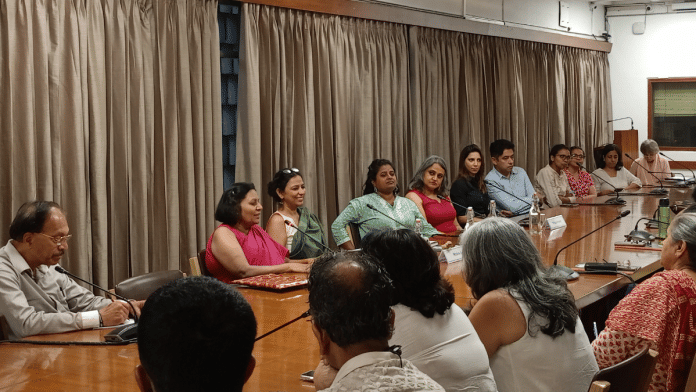New Delhi: What happens when three self-confessed “unconventional” mothers gather to talk about motherhood? A few disapproving comments, curiosity and acknowledgement of the changing nature of motherhood.
“Mothers who put themselves first attract all kinds of tags, from the good and bad to even slutty moms,” said Richa Jha, children’s author and founder of Pickle Yolk Books in her opening speech at New Delhi’s India International Centre. They were a mix of urban and rural mothers, who defied societal norms to choose their own version of motherhood. From giving up biological motherhood in favour of adoption to choosing IVF, these moms challenged the existing definition of ‘mother’, and by extension, a good mother. “The assumption that time taken out for myself is at the expense of the care that should be given to a child. Except my lived experience has been that taking that time out helps me build a better relationship with my daughter,” said Pooja Pande, author of Momspeak and a single mother.
At the very outset, Pande underscored the fact that the good versus bad mother binary and the idea of all-sacrificing ‘good’ motherhood is an inherently patriarchal and capitalist concept. Each of the three mothers on the panel took turns to share not just their own unique versions of motherhood but also opinions about the challenges of bespoke motherhood. “When we align being a mother with marriage, other forms of motherhood are challenged and not seen as ‘acceptable’,” said Pande.
The session, titled ‘Good Mom, Bad Mom and Motherhood’s Shifting Paradigms’ saw Kavita Bundelkhandi, co-founder and Editor-in-Chief of Khabar Lahariya and the first Dalit member of the Editor’s Guild of India, Vandana Sharma, advocate, and Pande, co-CEO, Chambal Media. It was moderated by Jha.
The audience, too, was engrossed in the discussion that easily extended 30 minutes beyond its stipulated time. The session was jam-packed before it was even set to begin on an extremely humid Monday. “I think such discussions help lessen the ‘mom guilt’ as a working woman. I am in the process of allowing myself my own life, independent of being a wife, mother or daughter-in-law, and every bit of visibility helps,” said Namita Anand, an audience member. Anand, a software engineer, has a two-year-old daughter.
Also read: Bengaluru women have a PG problem—unsafe rooms, intrusive landlords, useless CCTVs
Choosing a different motherhood
The discussion took the audience through various versions of motherhood that exist in society — from single parent, stepmother, and IVF mothers to working mothers — and the ‘guilt’ associated with anything that doesn’t fit into ‘conventional’ parenting styles.
Bundelkhandi was a child bride who chose to not have her own biological children. A traumatic experience with a botched abortion and the experience of taking care of her siblings shaped her decisions to have tubal ligation. She has since then chosen motherhood by adoption. “I love being a mother, and it is definitely not about biology for me. It gives me joy,” said Bundelkhandi. She is also the mother to her partner’s children and finds immense joy in bringing them up.
“The concept of stepmotherhood and its negative connotation came up because of TV serials. It has now almost interchangeably been used to also denote women who also cannot have babies,” added Bundelkhandi.
Vandana Sharma’s journey was shaped by a bad marriage and her eventual decision to step out of it. She wanted a child, but she knew she wanted to bring up the child on her own. It was early 2000 when IVF was unheard of. Sharma eventually studied to become a lawyer and educated herself about her own rights and fought for herself.
Her experience highlighted the institutional hurdles of being a single mother. “The hospital put my father’s name in the segment where they ask for the child’s father’s name. It took me 8 years to get it changed,” said Sharma. Jha asked if Sharma faced obstacles, societal or otherwise, in bringing her son up. She, however, shared that her child’s school staff had been supportive, and so were her friends. “As for my son, I would tell him, ‘You are the miracle of technology,’” said Sharma.
Also read: How the ‘Kaurs of 1984’ are surviving through pain, stigma. Audience tears up
Motherhood, institutions, gender
The discussion also raised points of institutional hurdles to mothers joining workforces like lack of feeding rooms or creches. Bundelkhandi pointed out that cities often lack the kind of network that exists among women in rural spaces, where children are often taken care of and brought up in a community form. Pande added that the anganwadi system, despite its flaws, has helped many women enter the workforce.
Not everyone could align with the views shared. A 23-year-old woman wanted to know how ‘good’ working mothers are. To which Sharma said, “ Why are working fathers never asked that?”
One male participant could not help but comment on Bundelkhandi’s statement about how witnessing painful childbirths deterred her from getting pregnant. He was also not entirely happy with how the discussion was not about good and bad mothers, but whether or not one should become a biological mother. “Medical science has now advanced and ensures painless deliveries. We have not discussed the mother’s role in the formative years of her child,” he said. He was promptly and firmly shut down by another member of the audience before the panel could respond.
“If men could give birth, their worldview and opinions about motherhood would change completely,” added Bundelkhandi.
The discussion drew to a close as an audience member shared her observation, “Could we liberate the idea of motherhood from gender?” It prompted a round of claps.
(Edited by Humra Laeeq)






